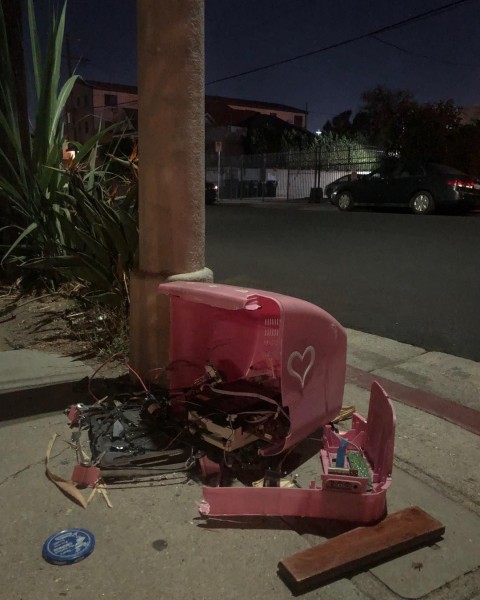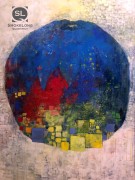Lily agreed to have dinner with me in my car. She wanted to see how I lived, and I wanted to see if she could handle it. When she arrived, I was checking my eyeliner in the rear view mirror. She knocked on the passenger’s side window with the blunt edges of her painted fingernails. In the crook of her arm was a wooden bowl covered in plastic cling wrap. I unlocked the doors, reached across the passenger’s seat, and let her in.
“I love hatchbacks,” she said, placing the bowl on top of the dashboard. “I used to have one for a while in college.”
“It’s surprisingly comfortable to sleep in,” I said.
“I slept in mine a couple times. Too wasted to drive home after parties, I think. If I’m remembering correctly,” she continued, “I wouldn’t describe it as ‘comfortable’.”
“Fair,” I said.
Lily poked me in the arm. She wanted me to lighten up.
“Is that salad?” I asked, pointing to her wooden bowl.
“Greek,” she said.
“Great. I’ll put some music on,” I said, and reached for my phone with sweaty hands. I scrolled aimlessly, unsure of what Lily would want to listen to. Superficially, she seemed much different than me. She was nine years my senior, grew up in Ohio, and worked as a graphic designer. I knew nothing about Ohio or graphic design. I’d met her at a coffee shop three weeks ago. Unlike me, Lily was an over-sharer. She told me she’d dated lots of women throughout her life, but also some men. She’d given a baby up for adoption when she was still in college. Said she still thought a lot about the child, who was now a teenager living somewhere in Minnesota.
“Where do you keep all your stuff?” she asked. She shifted her body to peer into the backseat. All that was there was a Tupperware container filled with paper plates, plastic spoons, and plastic cups. She seemed to expect piles of clothing, books, toiletries. The sorts of things that make people human.
“In the back,” I said. Then, acknowledging my half-lie, I continued, “Also, under the car. Well, when I have guests. There’s a lot of clutter, otherwise.”
She smiled. “And what’s for dinner?” she asked.
I observed her smile. It reminded me of my mother’s mouth when she also sat in the passenger’s seat–cracked and drained of life. Part of Lily’s discomfort, I knew, was her frustration with my reticence. I hadn’t told her what college was like, wasn’t eager to share anything about exes or family or traumatic experiences. These things didn’t make me feel any closer to people. In fact, they made me feel more alone than ever.
“Macaroni and cheese,” I said.
“How do you make that in a car?” Lily asked.
“I make it outside on a camping stove,” I said. “It’s easy when it’s not windy.”
“Wow,” she said.
“Yes,” I said. I opened my car door, walked to the back seat, and removed the bowl of macaroni and cheese.
“Do you have tongs?” Lily asked, watching me. “Something to serve the salad? I forgot to bring anything.”
I looked at Lily and she looked at me. Her eyes seemed to narrow, harden, shrink.
“I think I have something under the car,” I said. “But it’s under the car.”
“We can look,” she said.
“No, you don’t have to—” I started.
“To what?” Lily asked.
“You know what I mean,” I said.
“I don’t,” she said.
“The car. Everything,” I said.
“I mean, we can look,” she said, opening the passenger side door.
I placed the macaroni and cheese on the dashboard. Outside, Lily was already on her hands and knees, pulling Tupperware containers out from beneath us. A duet of scraping and sighs as she maneuvered around on the cold ground. Lily wasn’t even close to where a pair of tongs would be. I told her so. But she continued. She was in a box of socks and underwear, in a small bag of knitting yarn, in a Ziploc baggie of egg remnants from the one chick I’d seen hatch on my grandfather’s farm. Then she was reaching into a cookie tin filled with photos of old lovers. She pulled out a Polaroid photo of breasts I hadn’t seen in person in three years, tossed it aside.
“Stop—” I said.
But she didn’t stop. Next were my lucky coins, my childhood stamp collection, a series of state-themed magnets for the fantasy version of myself that owned a house with a kitchen and a refrigerator. Then another bin: my dead dog’s collar, expired acne prescriptions, a vibrator the shape and color of a skyscraper. She tried to turn it on but the batteries were dead. And still further, an older container: one box of journals from the past ten years, a suicide note no one but me had ever read, a stack of therapist’s business cards with numbers I’d never called, and so on. She scanned the letter, nodded, and placed it aside. Kept digging.
I shivered and got back in the car. I could see Lily’s calves and shoes protruding from beneath me. I pressed the car horn. She sprang up, dusted herself off, put her hands up as if to say, “What gives?”
But my foot was already heavy on the gas pedal by then. The sound of crunching over boxes filled with trinkets and paper, etc. In a brief moment of regret, I glanced at Lily’s form in the rearview mirror. She had found the tongs after all. She was already using them to sift through what little remained of me.



 The SmokeLong Grand Micro Contest (The Mikey) is now an annual competition celebrating and compensating the best micro fiction and nonfiction online.
The SmokeLong Grand Micro Contest (The Mikey) is now an annual competition celebrating and compensating the best micro fiction and nonfiction online.